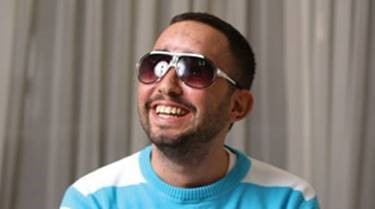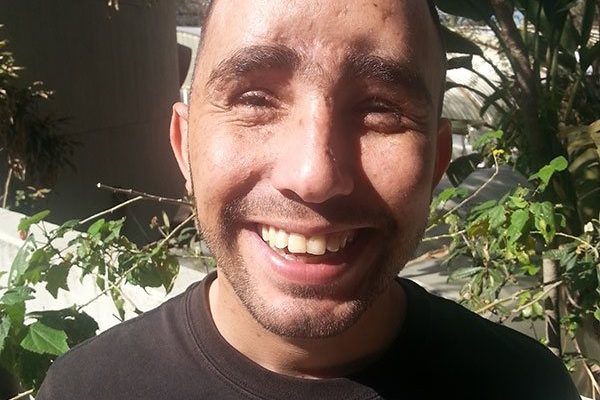“I really miss not being able to see the sky”
When Yehuda Persi wants to show off he says: “It’s because of me that Operation Pillar of Defense broke out.”
He’s right. On November 10, 2012, an anti-tank missile was launched on a Givati Brigade jeep in which commando fighters were patrolling. “Hamas will pay a heavy price,” said a senior Government official for the umpteenth time, but no one really believed him. However, the escalation following the event with Persi led to the outbreak of the military operation.
Three months later, 23-year-old Persi returned home to Ramle. His face still pock marked with shrapnel. He had already undergone numerous difficult surgeries on his head and eyes, with many more lying ahead of him as well as a lengthy rehabilitation process. Despite all this, the smile never leaves his face, a fact which makes his parents, Hannah and Israel, worry a little less sometimes. “I admire him for that smile and for his love of life,” says his father excitedly. “When I see him asleep in bed, I go up to him and lovingly pester him. I try to loosen him up and kid around with him as much as possible, but his mother is over protective and treats him with kid gloves.”
Yehuda is the eldest of four children. Theirs is an orthodox family, Hannah is a housewife, Israel was a shift manager at the plant where he worked but he left to look after his son.
Driving was always one of Yehuda’s greatest passions. In his pre-army training course and after being drafted in February 2009 he was assigned to be an ambulance driver in the Givati Infantry Brigade reconnaissance unit. “I was stationed at the regimental casualties clearing station,” he recalls, “and my job was to accompany them on their combat missions, arrests and operations, serving as back up.” Back then, between Operation Cast Lead and Operation Pillar of Defense, he doesn’t recall any particular incidents. Yehuda was discharged in 2012, but after five months as a civilian decided to go back and serve again this time as a career in the IDF. “I couldn’t find my place in civilian life,” he explains. “I tried all kinds of jobs but I didn’t feel like doing anything other than driving.”
When he returned to the army he was stationed at a Logistics Base of the Northern Gaza Division. In December 2012 he was supposed to fly to Thailand after which time he would begin his first year as a professional in the army. The incident which took place at the beginning of November changed his life. “The truth of the matter is that I don’t remember a thing,” he smiles again. “All I know is what I was told by the combatants who were with me in the vehicle, or from friends from the regiment who saw everything from a distance. That really disturbs me,” he admits. “I’d like to be able to remember myself what happened.”
At around 4:20 pm, Yehuda and his unit were driving along a curvy road, completing their patrol when a missile launched at them. It blew up on the hood of the car and shrapnel flew into Yehuda’s face. The tracker also got hit by shrapnel and the guy in the back seat was hit even harder. Everyone’s eardrums were damaged too.
According to initial reporting of the incident in the media, the patrol jeep had been moving along the inner route of the Gaza District border, near Kibbutz Nahal Oz. Terrorists from the Popular Front who were located inside the Sajaiya neighborhood in Gaza, successfully launched an anti-tank missile from 800 meters away. The missile penetrated the side of the armored jeep and came out at the other end.
At the time of the event, Israel, Yehuda’s father, was at home tuned-in as always to the news broadcasts. He heard there was an incident with four casualties and he knew it was where his son was serving. “I was about to pick up the phone and call him,” recalls Yehuda’s father, “but just then, at around 7 pm, there was a knock on the door. When I opened it, I saw two officers.”
They told him that Yehuda had been critically wounded in the head and eyes. “It took us 20 minutes to compose ourselves and they took us to Beer Sheva’s Soroka Hospital. When we arrived at the hospital Yehuda had just come out of head surgery and was on his way to another one on his eyes. He was completely covered in soot, his body ridden with shrapnel. As a parent the feeling was horrific. I was completely numb. I was afraid he’d remain paralyzed. At 3:30am the doctor told us the situation wasn’t good.”
However, like many other young wounded, Yehuda made a surprising and speedy recovery. He woke up after only three days at the Soroka’s intensive care unit.
After a couple of days he was transferred to the Neurosurgical Department where he spent the next two weeks until his release to the Rehabilitation Center at Tel Hashomer Hospital. He realized that his vision had been badly hurt. He knew he was blind. In the beginning he was told that his left eye was lost for certain but that they had transplanted a cornea in his right eye. There’s still a slight chance that he may have some vision in his right eye but the healing process is very long.
“When I was at Soroka, I didn’t really have the strength to react. Half the time I was heavily sedated and unconscious. I didn’t really know where I was. I only became aware of my condition after two and a half weeks when I got to Tel Hashomer. The first thing I asked was what I looked like. I kept asking the same question every two days.”
The doctors and nurses told Yehuda that he looked okay to keep his spirits up, but also explained that he had wounds. “I’m quite conscious of appearance. I constantly feel my face. I’m supposed to undergo more plastic surgeries on my head as well as get a prosthetic eye transplant and I still have pieces of shrapnel coming out of my body.”
When he was released from hospital, Yehuda’s wardrobe was rearranged. He knows exactly what clothes he has and tell his parents what he wants to wear each day. Yehuda can get around the house without help as he has committed its layout to memory. It’s important to him to be as independent as possible.
“The first time I decided to make a cup of coffee, my father jumped on the hot water dispensing machine so that nothing would happen to me. I light my own cigarettes, feeling my way, trying not to burn myself, I bought myself a talking wristwatch as well as a talking cell phone. I suppose if I lived on my own, I could manage. The bigger problem is everything that’s outside of the house.”
Right after the incident occurred, IDF tanks responded with heavy fire directed towards the residential neighborhood from where the missile had been launched. This retaliation apparently was the cause of death of four Palestinians who had been sitting in a ‘mourning hut’. In response, more missiles were launched onto Israel. Four days later, on November 14th, Operation Pillar of Defense broke out.
“As soldiers, you hear about incidents here and there, until finally you say to yourself, what sort of an army am I serving in, isn’t it ever going to respond to the provocation? I’ve had time to think about this and I believe that now the terrorists are afraid to come close to the fence. This is also a frustrating thought because you say to yourself, couldn’t the army have retaliated before all of this happened to me?”
Gadi Yarkoni, a paratrooper combatant wounded in 1995 and blinded in both eyes has since become a physiotherapist and a marathon runner. His rehabilitation story is considered a very successful one both from a professional and personal point of view. He keeps in touch with Yehuda and gives him support and encouragement. It’s part of a tradition of the blind Zahal Disabled Veterans who have built new lives with normal, healthy routines.

Yehuda Persi remains hopeful that he will see again — even if just a little bit.
Yehuda is a member of Beit Halochem and utilizes a range of their facilities. He is happy to be able to connect with others in similar situations to him.
His biggest challenges are navigating his space, not seeing his friends’ faces, and not knowing what the future holds. Before his injury Yehuda planned to study Electronic Engineering and now he is not so sure. He used to say “Why me?,” but “Thanks to my upbringing I have learned always to look ahead and learn to cope.”
“We are a religious family and despite my injury, I still have faith. As far as I’m concerned, until I am not given the absolute final verdict on my vision, I will still have hopes of seeing again, even if just a little bit. I really miss not being able to see the sky.”

Comments are closed.